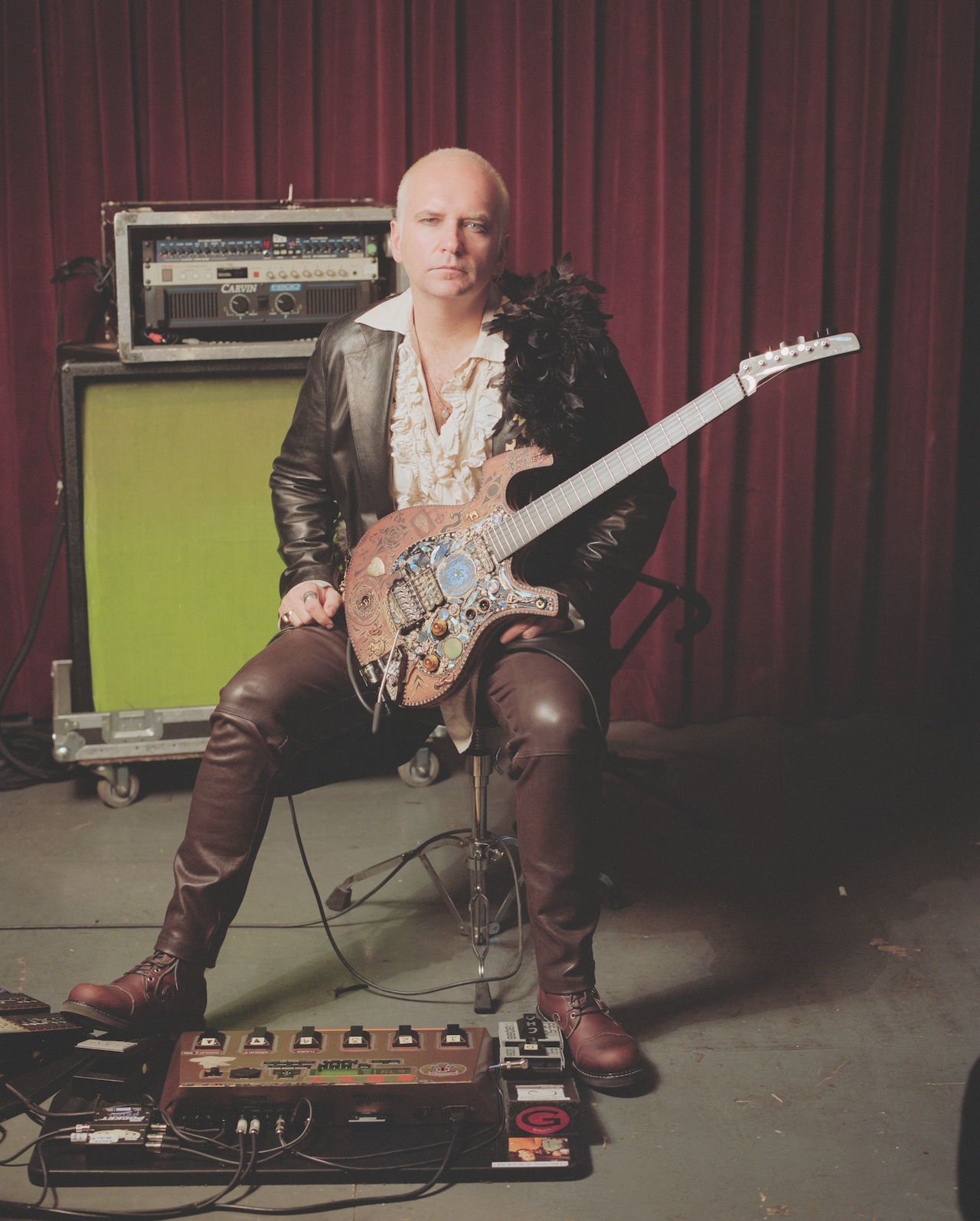“I got the idea: ‘What if I had something with a variable speed motor, like a Dremel?‘ My tech said, ‘Oh, you want a vibrator‘: David Bowie and the Cure guitarist Reeves Gabrels on the joys of taking your tone into uncharted waters

“Don’t get married to your effects.”
“Effects are no substitute for playing well.”
Over the years, guitarists have made these and similar comments in music magazines (even in the pages of Guitar Player). For his part, Reeves Gabrels is having none of it.
“Effects sometimes get a bad rap, and I don’t know why,” he says. “Effects can be marvelous tools to express yourself, but you have to use them creatively. I think the problem comes when guitarists don’t apply them with a sense of imagination. Copycat-ism is the real issue, and who wants to be a copycat?”
Thus far, nobody has had the nerve to suggest to his face that he relies too much on effects, but if such a scenario occurred, Gabrels imagines he would handle the situation in one of two ways: “If it was somebody I liked,” he replies, “I would say, ‘I think you’re wrong, but why don’t you watch the show tonight and tell me what you think?’ And if it was somebody I didn’t like, I’d say, ‘Well, then you must be a fucking idiot.’”

1. Your guitar and amp are one instrument
“People tend to spend a lot of time playing their electric guitars unplugged. I do it, too, but the fact is a guitar is designed to be put through an amplifier. Anytime you’re playing it unplugged, it’s calling out for its better half. It comes down to this: If you choose to play the electric guitar, play the electric guitar.
“There are practical reasons for this. How many times have you practiced something on an unplugged electric guitar, and the minute you plug in, it feels like everything is different? Until you’re plugged in, you don’t really know how the pickups will change the sound or what the amp’s speaker is going to do, how the notes will bloom and sustain. You might think you know how your pinch harmonics will sound, but you never really know until you run your guitar through an amp. Your electric guitar sound is something you should try to be familiar with.”
2. Look for effects and sound processing not made for the guitar
“I remember when the Korg Kaoss Pad came out in 1999. I had heard about it being marketed to DJs, and one day I read a review of it in one of the recording magazines. It said something like, ‘It’s really great. You can manipulate sounds and mix effects in real time. You can do all these things, and oh yeah – it has no application for guitar or bass.’
People need to take more chances. Look how Eno ran Fripp’s guitar through the filter section of a synthesizer
“I said to myself, ‘We’ll see about that!’ I went to 48th Street and bought a unit, and I immediately fell in love with it. I even used it at a gig that night. How wrong that reviewer was. I got a mic stand and built a little platform on it so I could put the Kaoss Pad right in front of me. It works on an X/Y axis, so you can move your finger across it and mix two different effects in different ways. You can make it sound like tape speeding up. It has random access, so it’s off when you’re not touching it.
“I figured out all kinds of things to do with the Kaoss Pad. It was so cool. That made me start to seek out more effects that were marketed for DJs and keyboard players. For a while, Alesis made these things called the Air Synth and the Air FX, and you could manipulate the sound by moving your hand around – there were no knobs. I had them both on my mic stand.
“With the Air FX I could do a ‘record slowdown’ thing, almost like a whammy pedal. They were in my guitar effects loop, and they worked great. Other people used them in the studio, but I used them live.”

3. Really get to know your effects
“Just like you need to practice your guitar and get to know everything about it, you should do the same with your effects. People tend to latch onto one or two things an effects pedal will do, and they use them for those things without exhausting everything they can do. The more you practice with an effect, the more it will become a musical instrument and less what a lot of people might dismiss as ‘noise.’
“Some effects pedals will surprise you. I remember, years ago, I bought a Univox Unitron pedal – it was like the poor-man’s Mu-Tron. When it was in bypass, it still went through a gain stage, so you could never get away from it. That disappointed me, but I used it in jams and I found a way to deal with the gain stage that I didn’t want but still use the pedal.
“Over time, I discovered that if I changed the settings to something that didn’t make any sense visually, it would do some really cool shit. I would hit a chord and nothing would come out of the amp at first, but then the sound would come out from the highest regions of space – the highest frequency of the chord – and then slowly it would reveal the full chord in all its weird, distorted glory. That was so cool.
“I think my playing had to catch up to what the pedal could do, but the point is, I never would have discovered that if I didn’t stay with it and discover what it was really capable of.”
4. A rant: effects aren't expressive enough. And where are the innovations?
“I’m going to disrupt the tips to vent for a few minutes. This is something I’ve said for years, actually, and it’s still the case: Effects are not interactive enough at this point in time, or at least I’ve not found them to be expressive enough. You turn an effect on or you turn it off. Even something as simple as a foot pedal to mix the effect in, it’s still a big deal. I’m talking about the commercially available stuff here.
“I would like to have the option of, say, plugging one or two volume pedals in and assigning them to any parameter I want per patch. That would be a simple one. I guess I could have a MIDI jack coming out of my skull, but we’re a long way from that. Well, maybe not. Whenever a new pedal comes out, it’s the same old shit and the same stuff we’ve already heard. The sense of adventure and discovery isn’t there. Maybe it’s because I’m old and jaded, but on the other hand, I’ve been feeling like this for a long time.
“People need to take more chances. Look how Eno ran Fripp’s guitar through the filter section of a synthesizer. Or the way Tony Visconti put drums through a harmonizer – that’s what I’m talking about.”
5. Anything can be an effect. If you don't mind looking silly
“When I was in Tin Machine, I wanted a certain texture that wouldn’t sound like a guitar or a synth. I got the idea: ‘What if I had something with a variable speed motor, like a Dremel?’ I mentioned it to my guitar tech, and he said, ‘Ohhhh.. You want a vibrator.’
“He went out and got one, and I tried using it with a Harmonizer. I discovered that if I put the vibrator back at the bridge, right where the string is, it would produce a sound like a slightly slowed-down violin or cello bow.
“By the way, in this case, size matters, because you need a vibrator small enough to hold in your hand. I also found that the further down I moved the vibrator on the string, it would create a pitch. I practiced with it and learned a bunch of things I could do with it. Anything can be a guitar effect if you’re inventive enough and don’t mind looking silly.”
Get The Pick Newsletter
All the latest guitar news, interviews, lessons, reviews, deals and more, direct to your inbox!

Joe is a freelance journalist who has, over the past few decades, interviewed hundreds of guitarists for Guitar World, Guitar Player, MusicRadar and Classic Rock. He is also a former editor of Guitar World, contributing writer for Guitar Aficionado and VP of A&R for Island Records. He’s an enthusiastic guitarist, but he’s nowhere near the likes of the people he interviews. Surprisingly, his skills are more suited to the drums. If you need a drummer for your Beatles tribute band, look him up.
“We’d heard Jimi Hendrix, we'd heard the Who, but now we finally got to see these guys. And watching Jimi Hendrix burn his guitar….” Grace Slick on Hendrix at Monterey, Jefferson Airplane and the Spanish origins of “White Rabbit”
“I’m still playing but I’m covered in blood. Billy’s looking at me like, ‘Yeah! That’s punk rock!'” Steve Stevens on his all-time worst gig with Billy Idol — and the visit to Jimi Hendrix's grave that never happened









